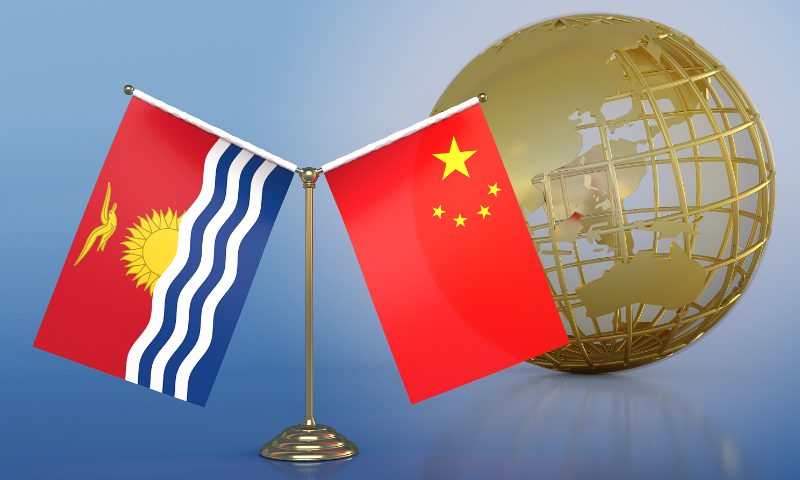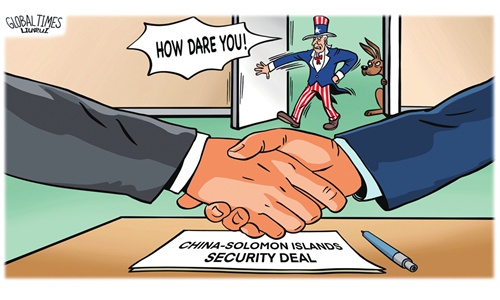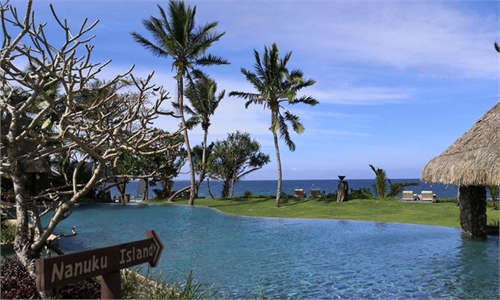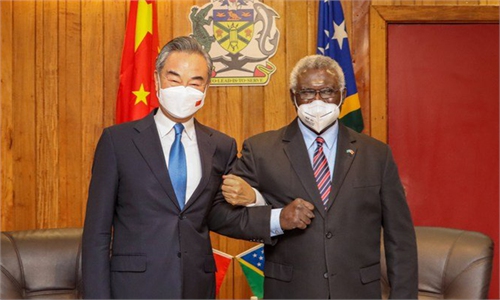Kiribati to ink 10 MOUs with China – a true, trusted friend to South Pacific countries: ambassador

China and Kiribati Photo: VCG
Editor's Note:
Kiribati sees China as an understanding, true and trusted friend, not a destabilizer in the Pacific as some have claimed, Ambassador of Kiribati to China David Teaabo (Teaabo) told the Global Times (GT) in an exclusive interview on Friday, the same day that Chinese Foreign Minister Wang Yi embarks on his first official visit to Kiribati since the two countries resumed diplomatic ties in 2019.
Teaabo said the two countries will sign about 10 MOUs for development cooperation during Wang's visit which is a "testament to the deepened friendship and strengthened partnership."
The envoy confirmed to the Global Times there is no so-called security agreement between China and Kiribati this time, and he urges some media "to refrain from publishing incorrect and contrary news about countries."

Ambassador of Kiribati to China David Teaabo Photo: Courtesy of the Kiribati Embassy in China
GT: How would you comment on Chinese State Councilor and Foreign Minister Wang Yi's visit to Kiribati?
Teaabo: The visit is an important milestone for Kiribati-China relations. This will further strengthen and promote partnership and cooperation between our two countries after the resumption of diplomatic ties in 2019.
The signing of about 10 MOUs for development cooperation between Kiribati and China that will be done during this visit is testament to the deepened friendship and strengthened partnership between our two countries.
GT: Some media have repeatedly reported that China and Kiribati are negotiating on security deals following a pact between China and the Solomon Islands. Can you confirm this?
Teaabo: I can confirm that there is no security agreement between China and Kiribati at this time.
May I also take this opportunity to kindly remind the international media organizations to refrain from publishing incorrect news about countries. Some media outlets have been directly informed by the government of Kiribati, yet they proceeded with publishing contrary news.
GT: Do you see China's presence in Kiribati and the South Pacific as a competitor to the US and Australia?
Teaabo: I don't see China's presence in Kiribati or in the Pacific as a competitor to the US and Australia. My take is that you have a better development if you have more friends. Communal sharing of possessions is one of Kiribati's social practices. The higher the number of people around me, the higher the chance for my needs to be addressed.
The government of Kiribati also applies this in our development aspirations as we believe that the more development partners we have, the more significant opportunities to enhance and complement to our development programs and activities.
GT: What are your thoughts on the development of China-Kiribati relations since the resumption of diplomatic ties between China and Kiribati over two years ago? What specific cooperation projects will China and Kiribati undertake under the Belt and Road Initiative? As per your observation, are people in Kiribati satisfied with the decision to restore diplomatic relations with China?
Teaabo: Personally, I view the China-Kiribati relationship to be significant and unique. As an ordinary Pacific Islander and diplomat, I see China as an understanding, true and trusted friend.
The government of Kiribati's Vision for 20 Years or KV20 is an ambitious long-term plan; China's development assistance and cooperation through its BRI supports some of the important infrastructure objectives of the KV20 including other financial and technical assistance to Kiribati's development needs.
The relationship is unique because Kiribati and China share some common attributes. For instance, first, both countries are principled peoples who have their own unique philosophies, traditions, cultures and arts that sustain their livelihoods and ways of lives; second, both countries underscore the importance of a people-centered democracy: Kiribati has a Maneaba system whilst China has the whole-process people's democracy system where the needs and voices of our communities and most vulnerable are heard and contribute to policy development and implementation; and third, both countries set visions for the future: Kiribati has the KV20 whilst China has the Long-Range Objectives Through the Year 2035.
More, I am aware that the pre-feasibility study on renovation and expansion of the airport in Kanton Island is one of the projects under the Belt and Road Initiative.
The majority of the Kiribati people are satisfied with the restoration of diplomatic ties with China. Before the end of its first term in 2019, the Tobwaan Kiribati Party led by President Taneti Maamau decided to resume diplomatic ties with China. This move created mixed feelings and concerns among the Kiribati general public and had become one of the key determining factors during general elections and the race to the presidential election in early 2020.
Kiribati voters' decision to re-elect President Taneti Maamau and Tobwaan Kiribati Party (TKP) to lead again is proof and support to Kiribati's resumption of diplomatic relations with China.
GT: What's your view on China's role in Kiribati and the South Pacific? After the signing of the security agreement between China and the Solomon Islands, some people have called China "a destabilizer in the South Pacific." What do you think of such an opinion?
Teaabo: I view the security agreement between China and the Solomon Islands as a sovereign issue, in this case for the advantage of the latter.
In responding to the statement whether "China is a destabilizer in the South Pacific," this depends on how one sees China's engagement in the South Pacific.
As a typical ordinary Pacific Islander, we believe China is an understanding, true and trusted friend therefore I do not see China as a destabilizer in the Pacific.




